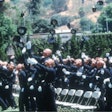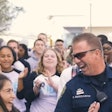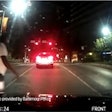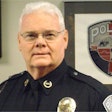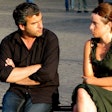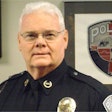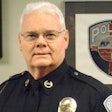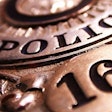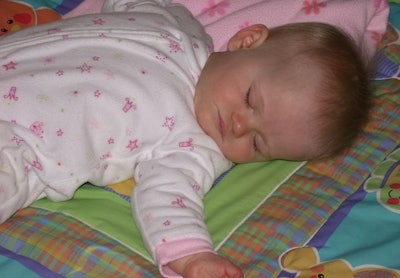 CC_Flickr: TedsBlog
CC_Flickr: TedsBlog
All cops carry images and memories that will remain burned into their minds for the rest of their lives. That's the nature of the business. Sometimes they are good memories: a practical joke, a really good pursuit, the shared camaraderie of fighting the good fight. Often, they are not so good: pain and suffering in all its horror and gore, the countless instances of man's inhumanity to man, and above all, the visceral pain that comes with watching children die. This is one of those stories.
It all started with breakfast. The "three beeper" went out just as my plate of scrambled eggs landed on the table in front of me. "Baby not breathing," and only one short block away from where a fellow sergeant (Eric) and I had just sat down for what we thought would be an early morning bite.
We probably made it to the front door of the home in less than 60 seconds. As we ran up to the steps, we were met by the mother—her face tear streaked and contorted by the terror only a mother can feel, hysterically screaming, "My baby, my baby!" It didn't take us long to figure out that one, she didn't speak much English and two, something had gone seriously wrong in the back bedroom she was frantically guiding us to. The first thing I noticed on my way to that back bedroom was that the house was dark. The second thing I noticed was that the bedroom was even darker. My futile flipping up and down of various light switches revealed a third issue, none of the lights worked. All of the really good problems in law enforcement usually end up being a compilation of multiple issues, all of them destined to make your performance under pressure as difficult as possible. This one was no exception.
By the light of our handheld torch, we could see the young father had what looked like an eight-month-old baby lying on the bed on his back. He was clearly trying to do chest compressions, but each time he pushed down, the bed compressed rather than the baby's chest. The scene was chaotic. The mother alternated between screaming and asking us if her baby was dead. The father was not responding to our repeated shouts to move the baby to the floor, and we both knew rescue folks were going to be at least five minutes out. When it was clear that the father was beyond hearing or understanding what we were trying to tell him, Eric just reached over and grabbed the kid and moved him to the floor. As he dropped down with the child I looked up and, for a second, stared straight into the father's eyes. He was done. Neither one of us had to say a word. The message was clear; his eyes were filled with the desperation and fear that any father would feel in that situation. He looked into my eyes and I read the plea, "Save my baby!"
With a certain mental shock, I realized it was game time. I dropped down and while Eric began compressions, I began mouth to mouth. Breathing for someone else is an almost surreal experience. Like most officers, I've had department CPR training every few years, but the differences between training on a mannequin and suddenly being confronted by the demands of saving an eight-month-old baby are stark. My brain was in overdrive: Am I doing it right? Is it 15 compressions to two breaths or 30 to two? Do I have a good seal over the nose and mouth? Am I blowing too hard?
In the end, we both did what countless cops before us have done, and many more after us will have to do in similar traumatic situations; we did the best we could. We both dropped down to our knees on that darkened bedroom floor and tried to save a life.
The next five to 10 minutes was a hazy recollection of breathing and compressions, intermingled with the sobs and tears of two hysterical parents, praying to God that these two strangers in blue would do what all cops everywhere are expected to do: make everything OK again. It was the longest five to 10 minutes of my life. Eventually, the fire folks showed up. In a whirlwind of tubes and equipment and bustling bodies, they hooked that young struggling life up and whisked him off to the nearby hospital.
As the sirens faded away into the distance we quietly stood alone on the now empty street, looked at each other, got back in our cars, and drove back to that same diner. We walked back to that same booth we had been sitting in such a short lifetime ago, then stared dumbly at each other, as that same waiter brought that same food back to our same table. I looked down at my plate of still warm scrambled eggs, then up at Eric as feelings and emotions swirled around inside me. I could see the same confused tangle of emotions reflected on Eric's face. Everything was the same, except us.
Later that morning we learned that the hospital got the baby's heart beating again. For a short time we both felt pretty good. But anyone in this line of work knows that there are very few "happy" endings in this business, and there was no happy ending here. The next day we called the family to see how the baby was doing. The mother told us in her haltingly anguished English that her baby died during the night. Before she hung up, she thanked us for trying, and said we gave her family a chance to say goodbye. It was a bittersweet consolation.
It certainly wasn't like the movies. That baby should have lived a long and glorious life, the parents should have made us honorary members of their extended and appreciative family, and Eric and I should have become surrogate "uncles" as we helped that beautiful child grow into a productive member of society. But this isn't the movies. That baby died, I ate my breakfast, and then went on with the cold, hard business of policing.
I've seen much of death over the years, but this one stuck with me. Maybe because I'm a father, maybe because my own children mean more to me than life itself, maybe because as I breathed for that child I couldn't help but see in my mind's eye the faces of my own son and daughter. Whatever the reason, that memory has been relegated to that special file of memories bound to stay with me for the rest of my life, safely tucked away under the "do not disturb" sign.
Ti Goetz is a lieutenant with the Hawthorne (Calif.) Police Department. He has worked patrol, gangs, detective bureau, internal affairs, SWAT, and is now a patrol watch commander.








